RGT leads the charge for inclusion of disabled athletes in virtual cycling
Project Echelon Racing, in a joint venture with RGT cycling, recently hosted a dedicated virtual event for handcyclists - marking a move for the inclusion of disabled athletes
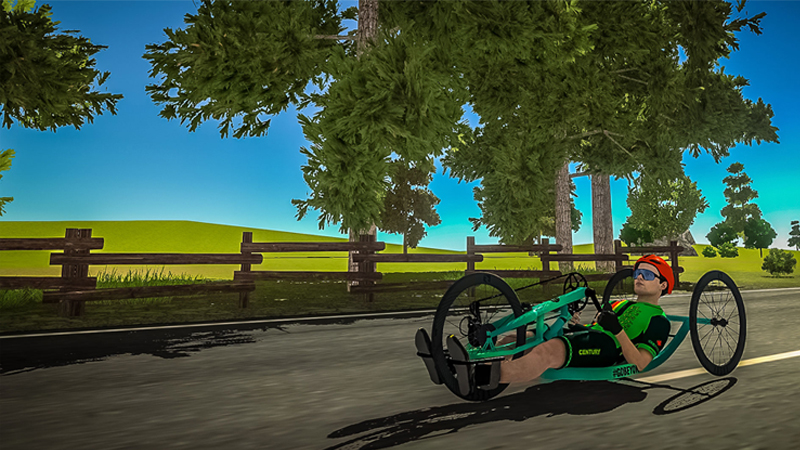
At the end of the 2021 season, Project Echelon Racing, together with RGT Cycling, took a major step towards virtual cycling inclusion, by hosting the first virtual event dedicated to handcyclists in collaboration with the Tour of America's Dairyland (ToAD). The response inspired the creation of the first virtual handcycling bike and lifelike avatar integration, marking a momentous step in terms of the inclusion of disabled athletes.
"ToAD has developed an amazing partnership with the Paralyzed Veterans of America," states Eric Hill, co-founder of Project Echelon. "It was important to them that we create this opportunity in the virtual space."
Transformation through physical activity
Hill founded Project Echelon, a non-profit organisation, with his friend, veteran Eric Beach, who struggled with suicidal ideation and addiction. The two transformed their lives through physical activity, and now the organisation educates, equips, and empowers veterans in much the same way.
"We use our professional racing team and the platform it provides to connect with communities and share our mission," notes Hill, "while also serving to coach, mentor, and engage with the veterans we serve." In 2021, Project Echelon assisted over 300 veterans and donated more than $70,000 in equipment grants, event entries, coaching services, and more.
Project Echelon entered the virtual cycling space when the pandemic paused the world as we know it and took away the platform to share and grow its mission. "At the same time," laments Hill, "the veterans we serve were experiencing new stresses that increased their symptoms of PTSD, traumatic brain injury, depression, and addiction due to world events they experienced."
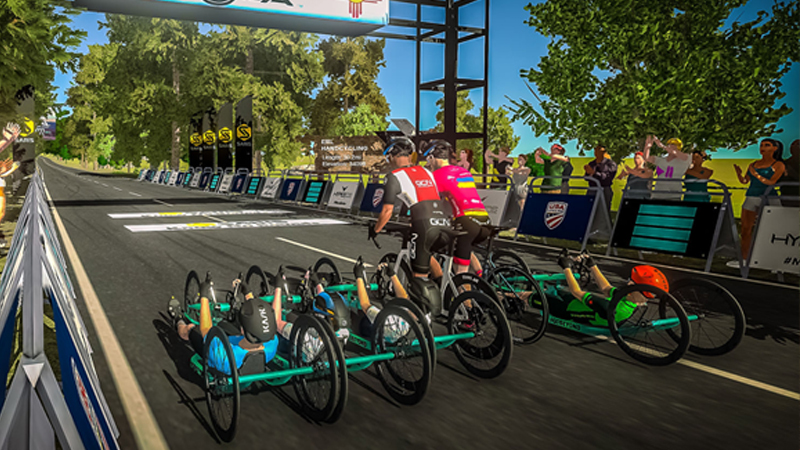
When the COVID-19 pandemic struck and put all forms of gatherings and racing on pause, it deprived athletes of the one thing that was helping with rehabilitation. Hill and Project Echelon began hosting virtual meet-ups on indoor cycling apps such as Zwift to keep people connected and advance the mission. "Some of these events turned competitive," he excitedly recalls, "and soon enough, we were organising races with some of the top riders in the country."
As their entrance into the realm of indoor cycling evolved, Hill and Project Echelon remained committed to creating something that helped the sport and the events, teams, and athletes. They partnered with USA Cycling and National Calendar race promoters and collaborated to organise virtual events that represented them.
Get The Leadout Newsletter
The latest race content, interviews, features, reviews and expert buying guides, direct to your inbox!
"We opted to transition from Zwift to RGT Cycling because of the realism the platform provides, the collaborative development of the user experience, and the ability to recreate real-life courses in the virtual world," he explained.
They formed the Echelon Racing League and, in 2020, 2.1 million unique viewers watched their event content for over 50,000 hours. Echelon Racing Promotions donates 22 per cent of its proceeds to the Project Echelon 501c3 charity in honour of the 22 veterans who take their own lives each day.
"We push the barriers and are redefining the space, bringing concepts and dreams held by real-world races to life virtually," Hill passionately shares. "We not only defined the boundaries, we removed the barriers." Removing barriers is what they did when hosting the first of its kind online handcycling event.
"The event was a success, and the energy levels were high but there was still a major problem: representation." Echelon went to work with Paralyzed Veterans of America to develop a plan offering a full-scale season of racing events for hand- and paracyclists, with 36 inclusive, competitive events scheduled for 2021/22 and over 225 athletes participating.
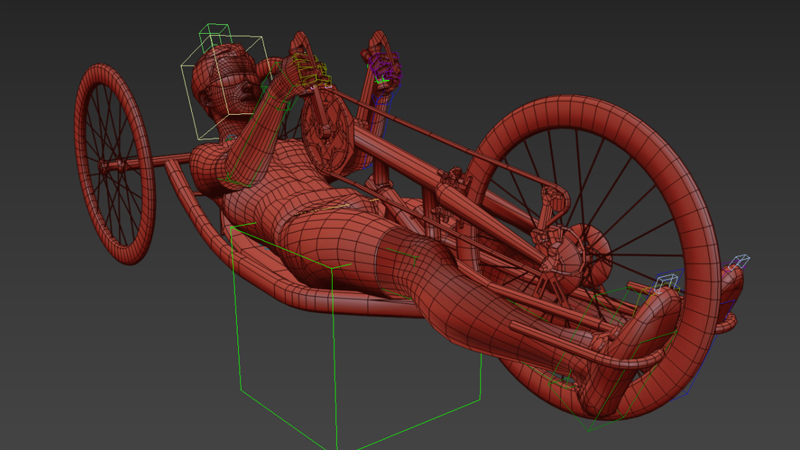
The power of representation and the challenge of handcycle avatar design
The representation picture wasn't complete without lifelike avatars and bikes, and that's where RGT Cycling and James Vickers came into the frame. "One of RGTs core brand values is accessibility," Vickers affirms. "So we were delighted to work with ERL on the production to make it happen."
For Vickers and the team at RGT Cycling, creating a handcycle was another opportunity to show "one of our other core values, and that is realism." The designers built the Empower Handbike from the ground up, recreating everything from the CdA, physics, and handling, in addition to the avatar's interaction.
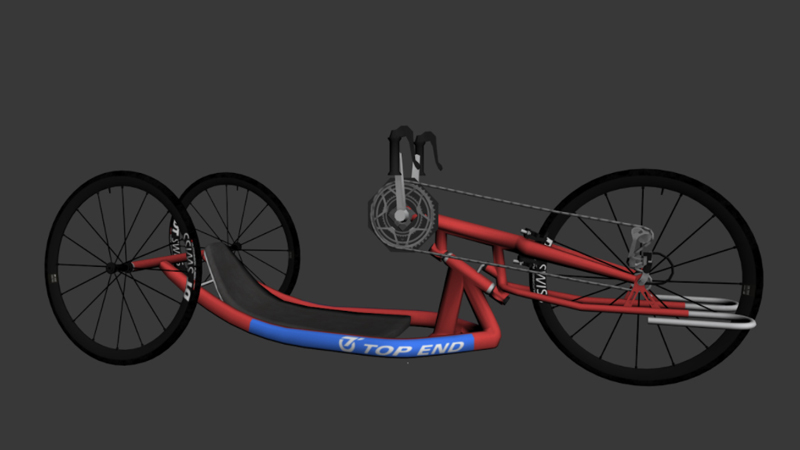
Over three months, they created the handcycle and reanimated the cyclist avatar. Designers calculated aerodynamic drag using wind tunnel data. World-class para-cycling athletes joined the conversation to ensure every detail was accurate and representative of the community and their athletic abilities.
"We're a tiny start-up with a tiny budget," explains Vickers. "And our entire 15 person team were all too happy to be involved in this project." According to retired US Army Infantryman and para-cyclist Paul Kilgore, they aren't the only ones.
A milestone for the adaptive cycling community
"The Echelon Racing League event on December 18 showcasing the handcycle is the greatest moment in adaptive cycling history for the virtual community," asserts 1SG (Ret) USA Kilgore. "And will be something that the entire community will look back on and reflect how monumental it was!"
For Eric Hill of Project Echelon and James Vickers of RGT Cycling, the community is what drives their passion for accessibility and makes the devotion worthwhile. "Our commitment is nominal when compared to the positive outcomes this will lead to for disabled athletes," Vickers summarised.
The Director of Diversity for USA Cycling and CIS Coach David Lipscomb agrees by saying, "Every individual wants to be mentally and physically whole, and this initiative creates an opportunity for disabled athletes to be a part of the whole." Coach Lipscomb emphasised the point when he added, "This is the trueness of diversity and inclusion because it can’t just be for some people."
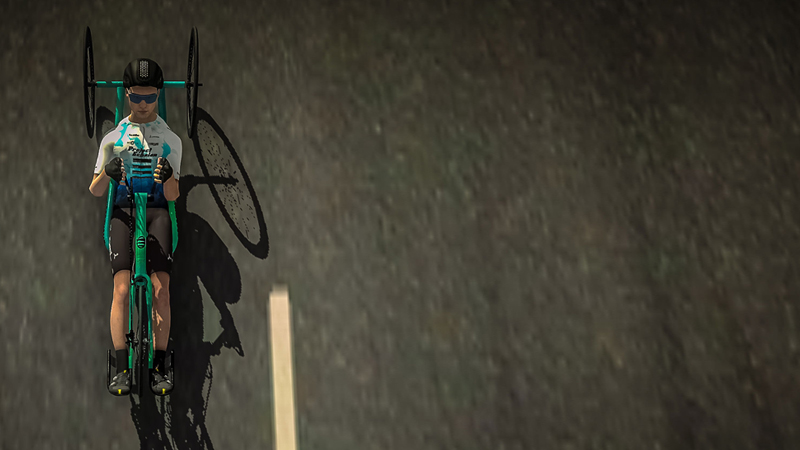
The future of inclusion in virtual cycling
The Diversity Director underscored that there is no instance, in his opinion, when the resource allocation outweighs the benefit for the inclusion of marginalised groups. It begs the question, "Why aren't more virtual cycling platforms committed to accessibility, realism, and inclusion concerning disabled athletes?"
Many of the other leading virtual cycling platforms are beginning to realise the importance of understanding the needs of their para-athletic community. According to Zwift spokesman Chris Snook, their team completed research recently and "has set up a workflow to advise and work with the game team on avatar customization and representation which includes, but is not limited to, representation for athletes with disabilities."
The Project Echelon and RGT Cycling teams have made it a priority. "When we create an opportunity for physical representation, we have an opportunity to gain perspective into the other person's world," Hill shares. Non-disabled athletes become more understanding, foster empathy, and create communication, collaboration, and community opportunities.
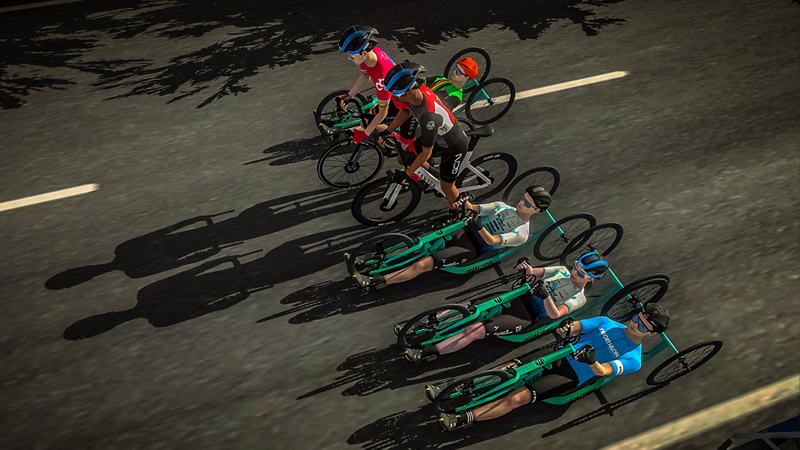
Hill, Vickers, and their teams have their hearts in the right place and the community foremost in their minds. "When we foster this culture and nurture a space where everyone feels welcome," urges Hill, "we can all do more and be more."
"I well up," reveals Vickers, "when retelling the story of a handcyclist who missed the start of a race because he was overcome with emotion while looking at how we represented him as himself for the first time in the virtual world."
That is what makes it all worthwhile for Hill, Vickers, and the organisations and communities they represent. By looking beyond the bottom line, we gain perspective into the immeasurable impact of our actions on the lives of those we can only begin to understand. We should all take note of this momentous event in the history of virtual cycling and seize the opportunity to do more and be more.
A physical therapist with over 25 years of experience, Christopher Schwenker is on a journey to give back to the cycling community for rewarding experiences and fulfilling relationships through the pages of his virtual cycling blog, The Zommunique’, and his cycling-related non-profit, The DIRT Dad Fund.